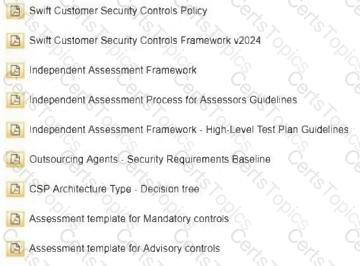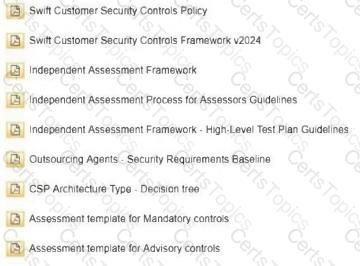Alliance Lite2 is a cloud-based solution for smaller institutions, providing a lightweight interface to the SWIFT network. The messaging operator in Alliance Lite2 is a role responsible for managing message-related activities, typically through the Alliance Lite2 Business Application (L2BA) interface. Let’s evaluate each option:
•Option A: Can create and modify messages
This is correct. The primary role of a messaging operator in Alliance Lite2 is to create and modify SWIFT messages, such as payment instructions (e.g., MT103) or other FIN messages. This is a core function of the L2BA interface, which provides a browser-based platform for operators to input, edit, and send messages. SWIFT documentation for Alliance Lite2 confirms that messaging operators have the necessary permissions to perform these tasks, aligning with the operational workflows supported by the platform.
•Option B: Can assign RBAC roles to RMA operators and messaging operators
This is incorrect. Role-Based Access Control (RBAC) role assignment in Alliance Lite2 is typically managed by a security officer or administrator role, not the messaging operator. The messaging operator’s scope is limited to message-related activities, not user or role management. In Alliance Lite2, RBAC is managed through the Alliance Web Platform, where a security officer (e.g., LSO) assigns roles to operators, including RMA (Relationship Management Application) operators and messaging operators. The CSCF Control "6.1 Security Awareness" emphasizes the separation of duties, ensuring that operational roles like messaging operators do not overlap with administrative roles.
•Option C: Can approve the Customer Security Officer change requests
This is incorrect. Approving Customer Security Officer (CSO) change requests is a high-level administrative task that falls under the purview of SWIFT’s security and compliance processes, often involving SWIFT’s support team or a designated administrator within the institution. In Alliance Lite2, this responsibility does not lie with the messaging operator, whose role is focused on message handling. The CSCF mandates strict controls for CSO changes, typically requiring multi-party approval outside the messaging operator’s scope.
•Option D: Can approve messages
This is correct. In Alliance Lite2, messaging operators can approve messages as part of the workflow, depending on the institution’s configuration. For example, a message created by one operator may require approval by another operator (or the same operator if configured with dual roles) before it is sent to the SWIFT network. This approval process ensures accuracy and compliance with internal controls, a feature supported by the L2BA interface in Alliance Lite2. SWIFT documentation highlights this capability as part of the messaging workflow.
Summary of Correct Answers:
The messaging operator in Alliance Lite2 can create and modify messages (A) and can approve messages (D), consistent with their operational role.
References to SWIFT Customer Security Programme Documents:
•SWIFT Customer Security Controls Framework (CSCF) v2024: Control 6.1 emphasizes role separation, limiting messaging operators to message-related tasks.
•SWIFT Alliance Lite2 Documentation: Details the messaging operator’s role in creating, modifying, and approving messages via L2BA.
•SWIFT Security Guidelines: Highlights administrative roles for RBAC and CSO changes, excluding messaging operators.

